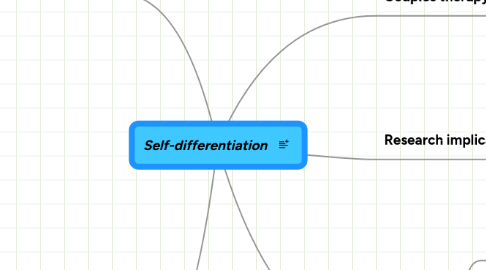
1. Interpersonal neurobiology
1.1. Affect regulation
1.1.1. Methodology
1.1.2. Defining
1.1.3. Therapeutic interventions
1.2. Psychotherapy
1.2.1. Integration
1.2.2. Relevant models
1.2.3. Client selection
1.3. Attachment theory
1.3.1. Systemic influences
1.3.2. Assessment tools
1.3.3. Patterns
1.3.4. Bowen's emotional patterns
1.4. Interpersonal fusion
1.4.1. Decreasing cut-off behavior
1.4.2. Increasing comfort with intimacy
1.4.3. Taking "I" position in the emotional process
2. Family therapy intern development
2.1. Interpersonal fusion
2.1.1. Increasing comfort with intimacy
2.1.2. Decreasing cut-off behavior
2.1.3. Taking "I" position in the emotional process
2.2. Clinical outcome assessments
2.2.1. Process vs. Outcome research
2.2.1.1. What accounts for a successful therapeutic experience
2.3. Advancing therapy
2.3.1. Assessing therapy advancement
2.3.2. Defining
3. Couples therapy
3.1. Cognitive Behavioral therapy
3.1.1. Negative core schemas
3.1.1.1. Outcome behavior e.g. Bowen's emotional patterns
3.1.1.1.1. Resulting interpersonal fusion
3.2. Interpersonal fusion
3.2.1. Decreasing cut-off behavior
3.2.2. Increasing comfort with intimacy
3.2.3. Taking "I" position in the emotional process
3.3. Adult attachment styles
3.3.1. Types
3.3.2. Current empirically validated research
4. Anxiety
4.1. Management
4.2. Physiological components
4.3. Cognitive components
4.4. Emotional components
4.5. Behavioral components
4.6. Mindfulness
5. Research implications
5.1. Quantitative
5.2. Qualitative
5.3. Process
5.3.1. Therapeutic relationship
